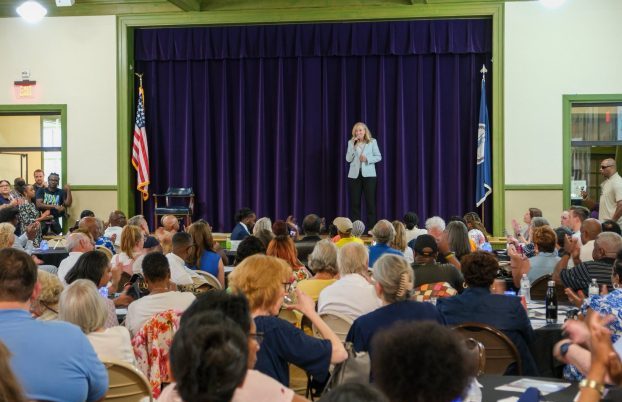Farmville town council sees budget decisions looming
Published 6:34 am Tuesday, March 11, 2025
The Farmville Town Council will have some choices to make in the weeks to come. As it stands, the town currently has a deficit of just over $1 million for the coming year. To fill that hole, it’s a question if the council will cut planned projects, adjust what it’s paying for health insurance or raise the tax rate.
The biggest surprise came in the form of health insurance rates. During their Wednesday, March 5 meeting, council members learned that there were a couple of issues with the health insurance plan. Health insurance is one of the top three expenses for the town each year. Farmville has been lucky, however, as it hasn’t seen a rate increase in several years. But part of that health insurance pricing is based on the number of employees who accept it. Farmville, like many smaller towns and cities in Virginia, buys their health insurance through the state. That allows smaller operations like Farmville to have more buying power. The rate varies based on the tier that you’re placed in.
That’s where the surprise comes in. The town of Farmville has 137 employees eligible for health insurance. Up until this year, more than 100 had accepted the town’s plan. But this year, several people withdrew, dropping the town into a lower tier.
“Our rate came in higher than we were expecting, because we assumed we’d be rated in the (more than 100 employees) market,” said David Rowe. He works as a benefits advisor with Bearing Insurance out of Roanoke, the group that manages Farmville’s health insurance.
Rowe said he and his group assumed Farmville would see a 1.6% increase in the cost of health insurance. But by having fewer than 100 employees take the insurance, Farmville’s number looks much different. Instead of a 1.6% rate increase, the town will see a 12% increase.
Farmville town council cost and effect
That 12% increase translates to an extra $244,582.78. The recommendation from Town Manager Dr. Scott Davis is to reduce another town program in order to cover that cost and some of the remaining shortfall.
Back in 2004, the town council voted to balance things out. For those who didn’t take the town’s insurance, they would get a stipend. Since then, the stipend has been capped at $8,500, which is what it is now. Davis suggested reducing that to $1,000 for the 39 who didn’t take the insurance. Council members didn’t see how they could do that.
“It’s like cutting somebody’s salary by $8,500,” Hunter said. “And for someone living paycheck to paycheck, what do you do? Is there another option?”
Davis said it was never meant to be a salary stipend, but rather just a way to help employees get health insurance. And he cautioned the council that it’ll be harder to get more people back on the town’s healthcare plan unless they reduce or do away with the $8,500.
Hunter asked if the town could scale down the $8500 in stages, spread out over several years, so they don’t end up cutting someone’s throat financially. And yes, that is doable, but it doesn’t help address the current $1.3 million shortfall.
Council member John Hardy argued that cutting back on the stipend would be a self-inflicted wound that the town may not recover from quickly. If you take that away, he pointed out, you basically reduce the take-home pay for 39 employees. Regardless of what the stipend’s original intent was, make that decision and employees will quit, Hardy said. Instead, he suggested looking at all other options first.
What are the options?
So that’s Option 1, reduce the stipend given to those employees who don’t take the town’s health insurance plan. That alone still doesn’t fully address the $1.3 million shortfall. In addition to the 12% health insurance rate hike, the town also has to address several capital improvement projects. There was the fitness court, which was put in the budget. The town received a grant to help cover the cost, but even with that, there’s still more than $200,000 worth of work left. Farmville also has to address the results of the released manhole cover study and the leaks it identified in the system. There are several other capital improvement projects also on the schedule.
That brings us to Option 2, which isn’t liked by anyone. The argument is that by increasing the tax rate, it would generate enough to cut into the shortfall. Currently, Farmville stands at 13 cents per $100 of assessed value. A penny on the tax rate in this decision roughly adds up to $80,000. Davis outlined what it would mean financially to raise the tax rate, showing examples of a 14, 15, 16, 17 and 18 cent rate. By comparison, Brookneal stands at 17, Blacksburg and South Boston are at 26 cents, Bedford is at 28, Crewe is at 30 and South Hill stands at 31. Option 4 would be to cut back some on the stipend payments and also delay some of the capital improvement projects. And these aren’t the only options available. It just depends on what council members are willing to change.
“We are going to end up having to cut things out of the budget,” Davis warned the board. “It’s just a matter of what.”
Hunter and fellow council member John Hardy asked why everyone was just learning about this now, rather than in the fall when it first came up.
“I’ve been involved in insurance for years. We should have known about (the health insurance rate) ahead of time and should have been doing something about it last year,” Hunter said. “When they fell below 100, we should have known about it.”
What’s next?
Davis plans to present the budget to the Farmville town council in April, with the intent of holding a public hearing in May.






